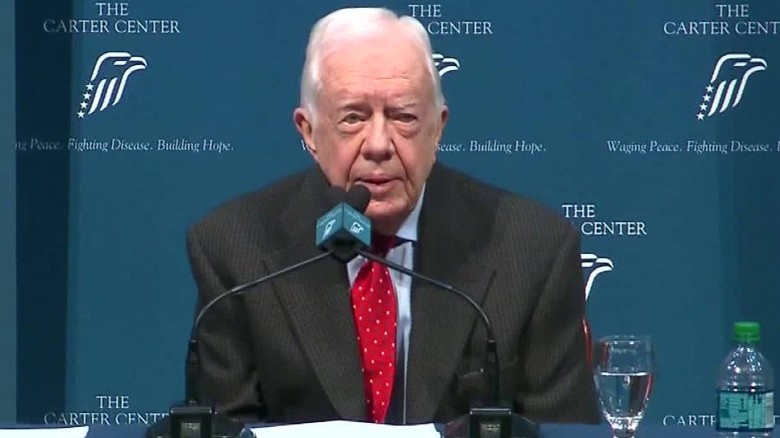DALLAS — Jimmy Carter might be best remembered for his post-presidential achievements rather than his tumultuous one-term presidency.

In 2014, during a trip to Dallas, Carter led 5,000 volunteers to help build over 100 homes for Habitat for Humanity. When asked how many homes he had helped build since the 1980s, Carter said, “3,800 is what the Habitat [for Humanity] folks have tabulated.”
At 90 years old, Carter, with his deep southern accent, recalled many firsts from his presidency, including being the first U.S. president born in a hospital. “I was. My mother was a registered nurse down in Plains [Georgia]. We had 500 people living in Plains. Now, we’ve grown to 630. And my mother was a nurse. She was the operating room assistant to the doctor. He wanted to get her back in the operating room as quick as he could, and he had an empty room across the hall from the operating room, so my mother had her baby in the hospital,” Carter told WFAA.
Carter once described himself as “Conservative, moderate, liberal and middle-of-the-road.” He was governor of Georgia in 1971 and was elected president in 1976 amid soaring energy prices and the aftermath of the Watergate crisis. Notably, Carter was the last Democratic presidential candidate to win Texas. Politically, he is remembered for brokering peace in the Middle East between Israeli Prime Minister Menachem Begin and Egyptian President Anwar Sadat. However, many remember his presidency for the crippling inflation that soared to 14 percent during his term.
In 1979, Iranian militants stormed the U.S. Embassy in Tehran, taking 66 Americans hostage. Carter worked until the final hours of his administration to free them. In a 2014 interview with WFAA, Carter highlighted another aspect of his legacy: “We’ve been at war almost continuously since the Second World War. If you look at it, I think we’ve been at war with 35 different countries now. When I was in the White House, fortunately, and by commitment, we never fired a bullet, we never dropped a bomb. We never launched a missile.”
When asked whether his legacy should be more political or humanitarian, Carter responded: “Well, I think both combined. I think the words I would like to have describe me; I kept the peace, and I did all I could to promote human rights. As we look on human rights, it’s not just freedom of speech, and freedom of the press and trial by jury but also the right to have a home that’s decent. The right to have food to eat. The right to have a modicum of education. The right to have a little bit of healthcare. Those are basic human rights. Quite often, an American doesn’t think about that for human rights. We think about political freedom.”
After leaving the White House, Carter did not retire to the speaking circuit but devoted himself to the common good, spending decades building homes around the world for Habitat for Humanity. To each new homeowner, Carter would give new house keys and a signed Bible. He stressed that it wasn’t a free place to live; each family had to pay full price and help build it. Carter proudly noted that he never saw a Habitat for Humanity home he helped build become dilapidated.
Carter remained an avid outdoorsman into his 80s, hunting wild turkeys during the spring season and eating quail and venison while avoiding red meat. In 2013, he attended the dedication of the George W. Bush Presidential Library in Dallas. Carter, a Democrat, was the first evangelical president but later supported gay marriage. “I think all people oughta have an equal right,” Carter told WFAA in 2014. He also believed that states should decide individually on whether to allow gay marriage, not the federal government.
The following year, on June 26, 2015, the U.S. Supreme Court’s landmark Obergefell decision required states to issue marriage licenses to same-sex couples and recognize same-sex marriages performed in other jurisdictions.
Jimmy Carter represents the end of an era when a peanut farmer from Plains, Georgia, could ascend to the world’s most powerful position. But he never forgot his roots. “You look back and you see, I’ve done all I possibly could as a human being,” Carter said at age 90. These words are a testament to a life well lived. History will likely remember Jimmy Carter as a humanitarian, peacemaker, and president who worked hard in each role to leave the world better than he found it.




